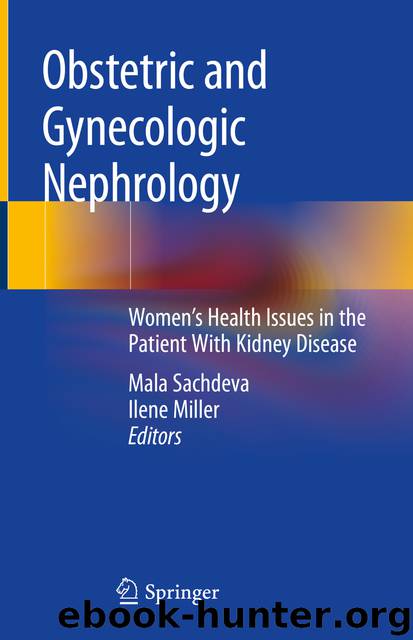Obstetric and Gynecologic Nephrology by Mala Sachdeva & Ilene Miller

Author:Mala Sachdeva & Ilene Miller
Language: eng
Format: epub
ISBN: 9783030253240
Publisher: Springer International Publishing
Thyroid Disease Management in Pregnant Women with ESRD
In women who already had a diagnosis of hypothyroidism or hyperthyroidism, medications will need adjustment due to aforementioned physiological changes of pregnancy. In women with a history of hypothyroidism, it is generally observed that there will be at least a 30% increase in thyroid hormone dose during the pregnancy [37]. As a result, it is recommended that a woman takes two extra doses of levothyroxine weekly once pregnancy is confirmed and contacts her endocrinologist [40]. As recommended in all persons with hypothyroidism, levothyroxine should be taken on an empty stomach 60 minutes prior to eating or taking other medications or vitamins to avoid poor absorption. Desiccated thyroid hormone, which has both T4 and T3, should not be used in pregnancy as T3 is unable to cross into the fetal brain [40].
For those with hyperthyroidism, achieving euthyroidism is important to avoid miscarriage, congestive heart failure, or even fetal death [39]. Methimazole (MMI) and propylthiouracil (PTU) are antithyroid agents used to decrease thyroid hormone production. PTU is preferred in the first trimester, as MMI is associated with the scalp deformity aplasia cutis congenita if used during that time [34]. PTU is associated with direct hepatotoxicity; thus it has become a second-line agent with the exception of the first trimester of pregnancy and allergy/intolerance of MMI. Both can be used during breastfeeding. Beta-blocker therapy can also be used for symptoms of hyperthyroidism. In pregnancy, labetalol is most commonly used [41]. In breastfeeding metoprolol or propranolol can be prescribed. If medications are ineffective due to adverse effects or poorly controlled disease, thyroidectomy in the second trimester is an alternative option. However, in the case of autoimmune disease, the antibodies can remain present and still stimulate fetal hyperthyroidism. Radioactive iodine with I131 to shrink the gland by cellular destruction is an option of management, but it’s contraindicated in pregnancy and for up to 6 weeks after cessation of breastfeeding [38].
In those without an established diagnosis of thyroid disease, universal screening is not recommended; however, women who are high risk should be screened. Also the TSH should ideally be 2.5 mIU/L or less in those who are in the preconception phase [37]. High-risk factors include age over 30 years, history of thyroid disease, history of head or neck irradiation, history of thyroid surgery, family history of thyroid disease, typical symptoms, goiter, presence of thyroid peroxidase antibody (TPO Ab), history of miscarriage or preterm delivery, or those who live in an iodine-deficient area [42].
Download
This site does not store any files on its server. We only index and link to content provided by other sites. Please contact the content providers to delete copyright contents if any and email us, we'll remove relevant links or contents immediately.
When Breath Becomes Air by Paul Kalanithi(7264)
Why We Sleep: Unlocking the Power of Sleep and Dreams by Matthew Walker(5642)
Paper Towns by Green John(4169)
The Immortal Life of Henrietta Lacks by Rebecca Skloot(3826)
The Sports Rules Book by Human Kinetics(3588)
Dynamic Alignment Through Imagery by Eric Franklin(3489)
ACSM's Complete Guide to Fitness & Health by ACSM(3469)
Kaplan MCAT Organic Chemistry Review: Created for MCAT 2015 (Kaplan Test Prep) by Kaplan(3423)
Introduction to Kinesiology by Shirl J. Hoffman(3301)
Livewired by David Eagleman(3122)
The River of Consciousness by Oliver Sacks(2992)
Alchemy and Alchemists by C. J. S. Thompson(2911)
The Death of the Heart by Elizabeth Bowen(2901)
Descartes' Error by Antonio Damasio(2731)
Bad Pharma by Ben Goldacre(2730)
Kaplan MCAT Behavioral Sciences Review: Created for MCAT 2015 (Kaplan Test Prep) by Kaplan(2492)
The Gene: An Intimate History by Siddhartha Mukherjee(2491)
The Fate of Rome: Climate, Disease, and the End of an Empire (The Princeton History of the Ancient World) by Kyle Harper(2436)
The Emperor of All Maladies: A Biography of Cancer by Siddhartha Mukherjee(2431)
